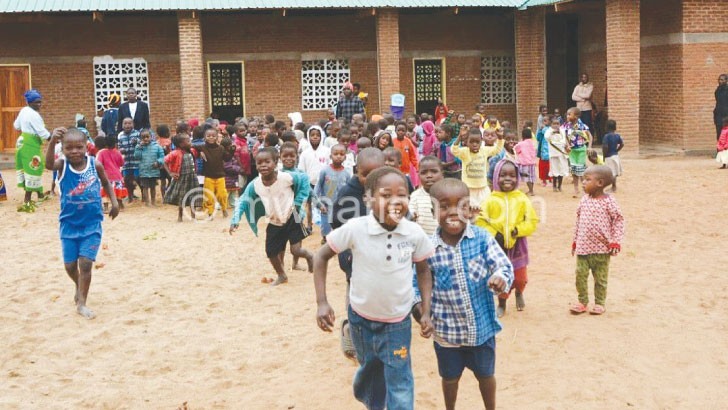Saved by a refugee camp
Rosa Sandra was woken by a loud noise. Then she heard another loud bang and got up to look out the window. There, she could see five men breaking down the door to her parents’ house. It was in 2016 and the conflict in Mozambique between government troops and the Mozambican National Resistance Movement had broken out again.
Rosa, 31, was able to hear the men shouting “Where are they?” as they smashed her parents’ belongings and let off firecrackers. Then it dawned on her: these men were not looking for resistance fighters. They were looking for her brother and sister, both light-skinned Africans. They had come to kill people with albinism.

“They were looking for my siblings because when the war started again, albino killings also intensified,” says Rosa. “They would hunt them down and remove their body parts. From what I heard, albinos were said to have [magical] powers and their body parts were good bait for fish.”
As luck would have it, that day her sister Alepha had slept in Rosa’s house and not in the main house. Her brother had gone to stay at her uncle’s house where he was doing odd jobs. As the men continued to search for Rosa’s siblings, she began screaming along with her parents. The noise alerted neighbours who rushed to help the family and the men ran away. It was clear Rosa and her family were no longer safe in their homes.
When Mariko heard the news, he returned home and together the family—her parents, siblings and other young children—fled to a village bordering Malawi. However, since the killings of people with albinism had intensified, the police advised them to seek refuge at Luwani Refugee Camp in Malawi. This was already a temporary home to around 3 800 of the reported 11 000 people who fled fighting in Mozambique.
Seeking refuge
Rosa and her family have been getting by in the camp, which has been challengings as they left all their belonging, including clothes, utensils and beddings in Mozambique. But at least now they are safe.
Malawi has two designated refugee camps—Dzaleka and Luwani.
According to the UN refugee agency United Nations High Commission for Refugees (UNHCR), the basic rights of refugees are respected, but they face restrictions on their lives.
“Everyone has the right to seek asylum from persecution in other countries and countries have a responsibility to host and protect persons who seek asylum,” UNHCR Malawi’s Lisa Quarshie says.
“Generally, the basic rights of refugees are respected in Malawi, but there are restrictions on their freedom of movement and employment. Refugees require permit to leave the camps legitimately. This hinders them from practising their skills beyond the camps, causing dependence on aid.”
In an effort to lead a normal life, Rosa decided to send her young son, Binafrey, to an early childhood development (ECD) centre in the refugee camp, supported by Unicef. ECD is an educational technique that uses stimulation to help the brains of young children develop. In poor countries, many young children are left idle as parents go out to work and do not have books or toys to stimulate them.
In the camp, the ECD centre was run by the Jesuit Refugee Services, but they did not have a learning space and classes were being held under a tree. Initially, Unicef procured and mounted tents, so the refugee children could take lessons protected from the bright sun and the rain.
However, during the dry season, it became very hot. So Unicef built a more permanent structure, which further improved the learning environment for the children.
Some 327 children, including 167 boys and 160 girls, are now enrolled at the centre, spread across three classrooms. Malawian children from nearby villages are also welcomed at the centre. And it does not matter what colour their skin is.
A brighter future
Jesuit Refugee Services ECD coordinator Jonathan Ziba says the centre is important for the children as it provides stimulation necessary for physical, spiritual and psychological development.
“I feel good because ECD is being provided in a structure that is well constructed,” he says. “Community members would rather send their children to a school building than a tent.”
Rosa and her relatives have been fortunate to find safety and education. But there are many people with albinism in both Malawi and Mozambique who are still at risk of violence because of their condition. And there are other refugee children who do not have access to ECD and education.
Unicef, with support from UK Aid, has conducted a study that analyses cases of attacks on people with albinism that have been investigated and prosecuted. The aim of the study was to understand the nature and trends of these cases and to identify challenges, opportunities and successful approaches in investigating and prosecuting offenses.
“There is no excuse for discrimination or violence against children living with albinism,” Unicef Chief of Child Protection Afrooz Kaviani Johnson says: “Every child has a right to feel safe and valued in society.”
Rosa says she is excited Binafrey is learning in a proper structure.
“Before, they were just mixed in one big group, which isn’t a good way to teach kids,” she says.
Rosa says Binafrey will now get the education. n





